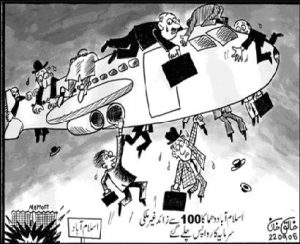As political season gets into full swing, one of the top issues is certainly the weak economic growth that the country has been suffering. Obviously there are many reasons why the economy has sputtered instead of taking off, but one important reason in particular is being overlooked. Arif Habib Group Chairman and CEO Arif Habib warned this week that economic growth is suffering due to negative perception of the country by foreign investors.
Speaking at a reception held in his honour by Ruhi Farzana Shafi, he said that “our capital markets are one of the best in the world providing 31 percent average return in the last 10 years, but it has been marred by image issues.”
Image issues? What issues could possibly mar our image with foreign investors? Could it be the image of two government officials – a governor and a cabinet minister – being assassinated for standing up for minority rights? Could it be the image of lawyers throwing flowers at confessed assassin Mumtaz Qadri? Could it be the fact that Osama bin Laden was found living outside Kakul? Perhaps. And perhaps instead of ignoring this growing threat, the judicary should take notice and put militants in jail rather than allowing them to go around shooting up the streets.
Or perhaps it could be the never ending stream of cynical media reports and political slogans terming the government elected by the people as the most corrupt, incompetent rulers. Or the media predictions that the government will fall any day now. Perhaps it is the statements of anonymous military spokesmen who claim that Army is using the judiciary to unseat a democratically elected president.
Could it be that the ‘image issues’ we have come from the fact that in the modern media age, all of our political hyperbole, constant complaining, and drawing room gossip is now available for the whole world to see? And maybe, just maybe, foreign investors don’t want to risk their money in a nation that can’t hold two elections in a row? Actually, there may be something to this.
According to research by economist Ishrat Husain published in the Columbia Journal of International Affairs, political instability – or the expectation of it – is a key obstacle to economic growth in Pakistan.
The tour d’horizon of the past sixty years of Pakistan’s economic history lends credence to the argument that interruptions to the orderly political process whereby elected governments were dismissed, forced to resign or overthrown further accentuated the tendency of risk aversion. Besieged with a feeling of uncertainty over their future, elected representatives have indulged in distribution of patronage to their supporters as well as to self-enrichment. Both the preoccupation with keeping power—applied to both the military rulers and the elected regimes—and fending off attacks from the opposition by co-opting them through state patronage or by coercion has led to laxity in fiscal and monetary policies and to the concentration of economic and political power. The excessive use of discretion in case-by-case policymaking to favor narrow interest groups has derailed institutionalized decision-making based on well-established rules and transparency in transactions.
The solution, Ishrat Husain says, is obvious:
The lesson to be learned from this experience is quite obvious but worth repeating. Democracy, with such flaws and shortcomings as corruption and patronage, may cause economic disruptions and slow down development in the short-term. But it should be allowed to run its course as the inherent process of fresh leadership and governmental accountability through new elections provides a built-in stability to the system that eventually brings the economy back to equilibrium. Interruptions to the democratic process in the name of economic efficiency have created more problems than solutions in Pakistan.
With Senate elections only three months away, and general elections soon to follow, derailing the democratic process would be gratuitous and self-defeating at this point. Whatever might be gained by installing this mythical government of selfless technocrats would be more then undone by the demonstration of impatience and unwillingness to abide by the rule of law.
If the people want to change who’s in office, let them choose so with their ballot. Economies don’t turn around overnight. If we want the economy to improve, we should elect those who we believe have the best policies to improve it and give them a chance to do so without terming them a failure before they can even start.
![]()






